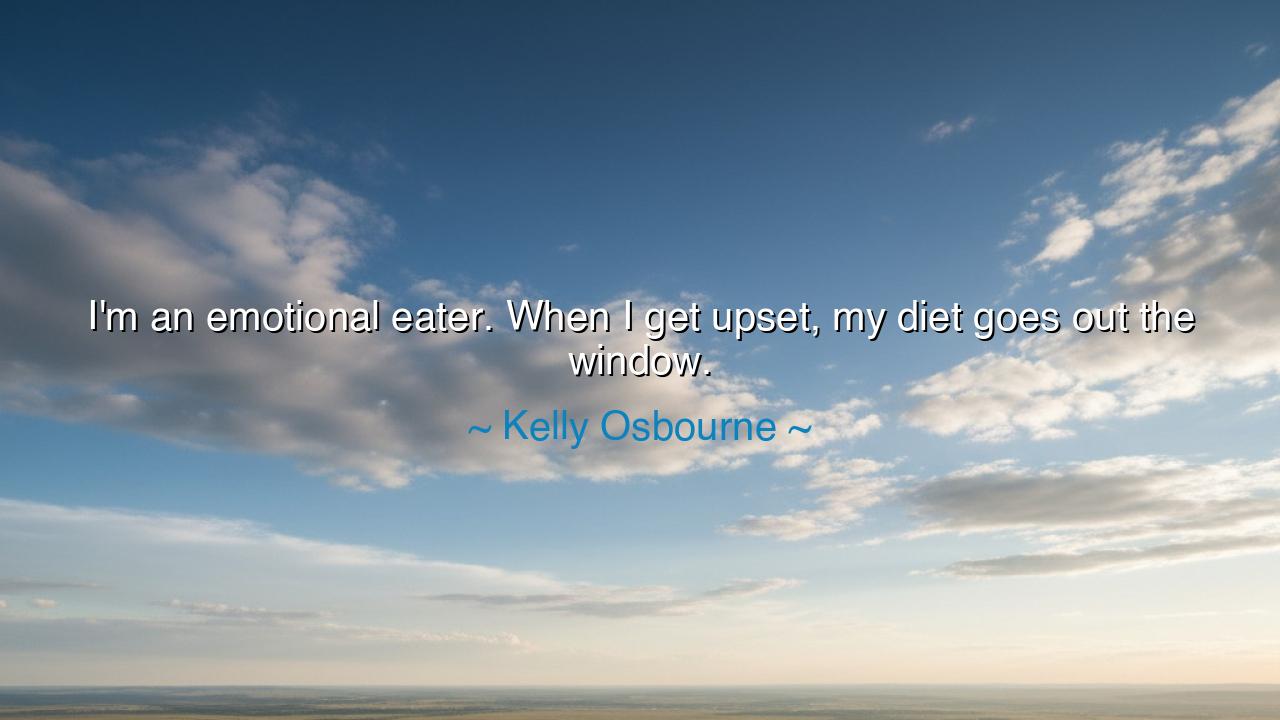
I'm an emotional eater. When I get upset, my diet goes out the






In the honest and vulnerable words of Kelly Osbourne, we hear a truth that echoes through the hearts of many: “I’m an emotional eater. When I get upset, my diet goes out the window.” What she confesses is not merely about food—it is about the eternal struggle between the heart and the will, between the pain we feel and the ways we seek to soothe it. Her words lay bare a condition older than civilization itself: the human tendency to seek comfort not through healing, but through distraction. In this case, food becomes both a refuge and a trap, a temporary balm for the wounds that life inflicts upon the soul.
To say, “I am an emotional eater,” is to admit that one’s appetite is not governed by hunger alone, but by the tides of feeling—sadness, loneliness, anger, or fear. When emotion overwhelms, the mind grows clouded, and instinct takes the reins. The diet, the discipline, the plan—all vanish in the storm of the heart. Yet in this confession lies something deeply human, for who among us has not sought relief in moments of despair? Some turn to drink, others to noise or indulgence, but the principle is the same: we seek to fill the emptiness within by satisfying the body without. Osbourne’s words remind us that to understand this impulse is not to judge it, but to learn from it—to discover what the hunger is truly for.
The ancients knew this struggle well. Epicurus, often misremembered as a philosopher of pleasure, taught that true happiness is not found in constant indulgence, but in understanding the nature of desire. He warned that pleasure pursued without reflection leads not to joy, but to suffering. “Empty is the stomach of the glutton,” he might have said, “for it seeks to fill what the heart has hollowed.” Kelly’s confession mirrors this truth: that no meal can satisfy a grief unhealed, and no flavor can soothe a restless spirit. Food may silence pain for a moment, but the silence is fleeting, and the hunger returns, sharper than before.
Consider, too, the story of Queen Marie Antoinette, who in her gilded halls surrounded herself with luxury and sweetness. While her people starved, she filled her days with banquets and her nights with confections, mistaking excess for satisfaction. But in truth, her indulgence was not born of malice—it was born of emptiness, of isolation and fear. Surrounded by grandeur, she was still starving for meaning, for peace. So too, many in the modern age live in abundance yet hunger in spirit. They feed their bodies not from necessity but from longing—a longing to feel whole, loved, and safe.
Osbourne’s words reveal that she has come to recognize this cycle within herself, and such recognition is the first step toward wisdom. For what the ancients called gnōthi seauton—“Know thyself”—is the foundation of freedom. To know that one eats from emotion, not hunger, is to pierce the veil of ignorance. It is to stand before the mirror of the self and say, “This is what I do when I hurt.” Such honesty is rare and courageous, for it marks the beginning of transformation. One cannot master what one refuses to see.
But there is another layer to her confession—one of compassion. Her words remind us that discipline without understanding is cruelty, and that those who falter are not weak but wounded. The ancients would have likened her struggle to the wars of the soul described by Plato, where reason and passion fight for dominion within the human heart. The wise do not destroy passion, for it is part of our nature; instead, they learn to guide it. So, too, must the emotional eater learn to face their pain, not with punishment, but with patience—to find healing not in denial, but in mindfulness and care.
Let this, then, be the lesson drawn from Kelly Osbourne’s words: when the heart hungers, feed it not with food, but with understanding. When sadness comes, do not drown it in sweetness—sit with it, listen to it, learn what it asks. The true diet is not of calories, but of consciousness. Eat with intention, not escape. Let food be nourishment, not numbing. And when you stumble—as all will—rise without shame, for awareness grows through failure as much as success.
In the end, her confession is not one of defeat but of awakening. It reminds us that the path to balance is not found through rigid control, but through compassionate awareness. The body reflects the state of the spirit, and to heal one, we must honor both. As the ancients taught, “A sound mind in a sound body” is the highest form of harmony. So, eat when hungry, rest when weary, weep when sorrow calls—and in all things, seek to understand the heart beneath the hunger. For when we feed that heart with truth, the appetite for peace finally begins to grow.






AAdministratorAdministrator
Welcome, honored guests. Please leave a comment, we will respond soon